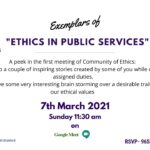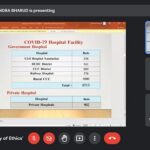Shri Dilip Patel welcomed all the participants and thanked them for sparing their time for taking part in the present meeting of the ‘Community of Ethics in Public Service’ (CoE). He first introduced the speaker of the day.
Shri Umkant Umrao, IAS, 1996 Batch, Madhya Pradesh Cadre, spoke about how as the District Collector of Dewas, Madhya Pradesh, his challenge was to find an economically viable and sustainable solution to the district’s water woes. He executed a smart water-harvesting solution for quenching the thirst of many drought-prone villages: he built ponds to trap the monsoon waters for irrigation. His efforts which began in 2006 with 40 large-scale farmers, eventually resulted in more than 16,000 ponds spread across 60-80 acres of land, and over 1,000 farmers earning more than Rs 25 lakhs a year. Additionally, the region has not only seen a speedy rise in its ground water level but has witnessed a 20-fold increase in irrigated land – from a mere 18,000 hectares to more than 4 lakh hectares.
He gave the credit for the success of the Dewas Model to the community. He explained how water crisis is an economic rather than a social problem, and how the solution, too, needs to be based on an economic model: this is the key mantra of the Dewas Model. It is a business model of rainwater conservation, which is environmentally sustainable.
He explained how 80-90% of our water consumption is in the agricultural sector, which relies mainly on groundwater. This is dangerous. The water we receive via rainfall is more than sufficient to meet our consumption requirements. However, the water conservation technology that is taught in technical institutes like the IITs is focused on river basins as the water source, whereas rainfall can be the main source.
He further explained how farmers invest their own resources in many aspects related to agriculture, but where water is concerned, they do not go beyond tubewells and wells. The water conservation mission started by him sensitised the farmers that by harvesting rainwater as suggested under the mission, they would be making a profitable investment that would be sustainable.
An engineering design of ponds was evolved which substantially reduced the amount of wastage between the rainfall and the water that finally reached the farmlands. Thus, the rainwater was much better utilised, the irrigation needs of the farmers were fulfilled, and the model was economically viable.
He made water harvesting into a business model, rather than simply a civic duty. The idea was to develop an economically viable model for large-scale farmers who could invest in building a pond in only 10th or 20th part of their farmland. The water collected in these ponds for irrigation purposes would then not only benefit them, but also the small farmers around. So, by calculating the need of water required depending on the farm size, the officer made personalised proposals for digging ponds. ‘Bhagirath Krishi Abhiyaan’ was launched which transformed the farmers into role models or agents of change.
Soon, the word spread to nearby districts like Vidisha, Ratlam, Mandsaur, Ujjaina and Raisen, where farmers adopted the same model. Seeing the success rate, more banks began to provide loans to smaller farmers and at lower rates as well. The villages are now prosperous, and due to their transformed ecosystem, they have emerged as hotbeds for migratory birds like Siberian cranes, butterflies, etc.
Some other States have also adopted the Dewas Model and its success motivated the Madhya Pradesh government to create mass impact in 2008 by adopting the Dewas Model under the name, Balram Talab Yojana. In 2011-12, it was selected by the United Nations as one of the three top water management practices globally.
He shared some images of the increased prosperity of the farmers due to the Dewas experiment.He said that as far the ethical angle is concerned, as the DC, he kept the doors and windows of his office always open as a ‘universal access office’, and he was always available for the people. As the DC, he did not sit in his office but went to the farms (after getting his car parked some distance away from the farms and then walking to the farms) and spoke to the farmers about water conservation standing with them in their fields.
He requested the participants of the webinar to visit Dewas, and plan at least a 3-day trip. He said that he personally recommends a 7-day trip. The farmers are big-hearted, and welcome visitors.
To conclude, he said that when public servants reach out to the community, they think that they can change the community, but the fact is that that the community also changes them. He said that he was a changed man after the Dewas experience.
Shri Dilip Patel thanked Shri Umrao for sharing this inspiring story, and regretted that due to lack of time, one of the farmers who was a beneficiary of the Dewas model was not able to interact with the audience.
Shri Prabhat Kumar concluded the session by saying that it had been a wonderful event. He said that he is intrigued to find out what drives some public servants to do the things that they have done ( for example, the stories we heard in our webinars by officers like Shri Prasanth Nair, Shri Jitendra Soni, Shri Umakant Umrao, Shri Tushar Girinath, etc.) and why other officers in similar positions of authority do not behave the same. Perhaps they are guided by their personal ethical vision. The challenge before the CoE is: can we develop our common ethical vision for Public Service? He said that he would like to leave this thought with the people present to ponder over.
Shri Dilip Patel said that the session was very satisfying for him, and feedback on it from the participants would be most welcome. The participants would be informed about the date of the next webinar in due course.


